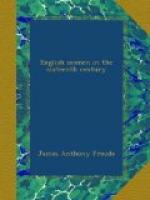It was life or death to Elizabeth. The Ridolfi plot, an elaborate and far-reaching conspiracy to give her crown to Mary Stuart and to make away with heresy, was all but complete. The Pope and Philip had approved; Alva was to invade; the Duke of Norfolk was to head an insurrection in the Eastern Counties. Never had she been in greater danger. Elizabeth was herself to be murdered. The intention was known, but the particulars of the conspiracy had been kept so secret that she had not evidence enough to take measures to protect herself. The privateers at Dover were a sort of protection; they would at least make Alva’s crossing more difficult; but the most pressing exigency was the discovery of the details of the treason. Nothing was to be gained by concession; the only salvation was in daring.
At Antwerp there was a certain Doctor Story, maintained by Alva there to keep a watch on English heretics. Story had been a persecutor under Mary, and had defended heretic burning in Elizabeth’s first Parliament. He had refused the oath of allegiance, had left the country, and had taken to treason. Cecil wanted evidence, and this man he knew could give it. A pretended informer brought Story word that there was an English vessel in the Scheldt which he would find worth examining. Story was tempted on board. The hatches were closed over him. He was delivered two days after at the Tower, when his secrets were squeezed out of him by the rack and he was then hanged.
Something was learnt, but less still than Cecil needed to take measures to protect the Queen. And now once more, and in a new character, we are to meet John Hawkins. Three years had passed since the catastrophe at San Juan de Ulloa. He had learnt to his sorrow that his poor companions had fallen into the hands of the Holy Office at last; had been burnt, lashed, starved in dungeons or worked in chains in the Seville yards; and his heart, not a very tender one, bled at the thoughts of them. The finest feature in the seamen of those days was their devotion to one another. Hawkins determined that, one way or other, these old comrades of his should be rescued. Entreaties were useless; force was impossible. There might still be a chance with cunning. He would risk anything, even the loss of his soul, to save them.
De Silva had left England. The Spanish ambassador was now Don Guerau or Gerald de Espes, and to him had fallen the task of watching and directing the conspiracy. Philip was to give the signal, the Duke of Norfolk and other Catholic peers were to rise and proclaim the Queen of Scots. Success would depend on the extent of the disaffection in England itself; and the ambassador’s business was to welcome and encourage all symptoms of discontent. Hawkins knew generally what was going on, and he saw in it an opportunity of approaching Philip on his weak side. Having been so much in the Canaries, he probably spoke Spanish fluently. He called on




